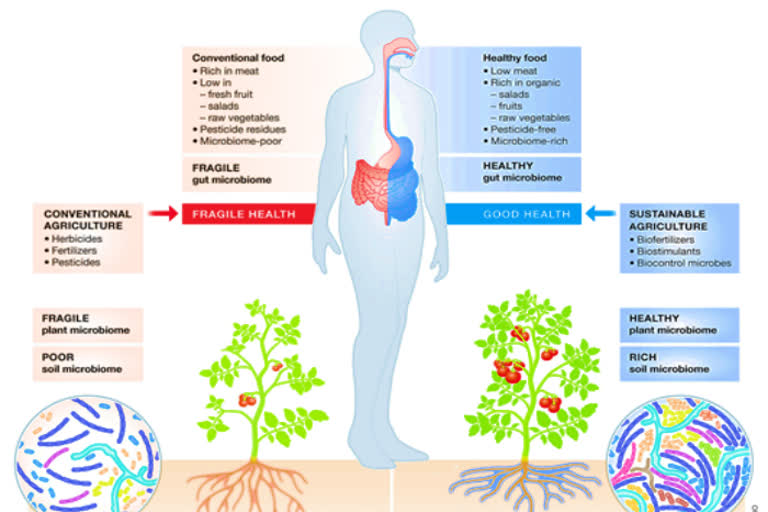Hyderabad: The recent census data indicated that India’s population has swollen to 1.35 billion by 2019. The world population has also been rising rapidly. The need to feed this expanding population has been a matter of concern. A more important challenge is to do feed the population in a sustainable way. With increasing problems from environmental pollution, there is an impending threat of a decrease in the availability of food resources on a global scale.
Understanding the processes by which the animals and plants co-exist, will pave the way to make effective use of the microorganisms for sustainable development, by decreasing the usage of synthetic chemicals, to provide chemical-free food to the growing population and safety for the environment. June 27, 2021, is World Microbiome Day. On occasions like this, we celebrate all things microbial, all around the world.
Read:| IHBT scientists discover microbes which produce bioplastic
As the world reels under the microbe-posed threat to mankind, ironically the focus for World Microbiome Day 2021 is on how microbes can contribute to a sustainable future.
What microorganisms do
Microorganisms (e.g. bacteria, fungi, viruses, archaea, etc.) are ubiquitous. They can be found everywhere in and on plants, animals, water, soil, food and humans. Microbes can be seen in the deep sea, Antarctica and outer space. In each of these habitats, microorganisms live together in communities called microbiomes. Microbiomes strongly influence the health of humans, animals and plants and therefore the entire planet.
Microbes have a tremendous effect on plant and animal (including human) health, a fact undiscovered for ages, but now proven through scientific evidence in the 21st century. Scientists are exploring how these communities of organisms coexist with us, animals, plants and with our environment. Despite their ubiquity and diversity, the importance of microbes in maintaining healthy global ecosystems is often overlooked. Let us look at the simplest examples, where the link between Covid, the gut microbiome and sustainable development are evident.
Microbes in the gut
We know our body reacts to what we eat but it has never been evident how our body reacts to what we eat. Now there are ways to find the food that suits you the best, boost your body and improve your gut health. Diet, environmental factors and genetics play an important role in shaping gut microbiota which can influence immunity. Gut microbiota diversity decreases in old age. We have seen, Covid-19 has been mainly fatal in elderly patients which points to the role the gut microbiota may play in this disease.
Improving gut microbiota profile by personalized nutrition and supplementation is known to improve immunity has been a proven hypothesis. It can be one of the prophylactic ways by which the impact of consecutive Covid waves can be minimized in old people and immune-compromised patients. Scientists strongly believe felt that more trials are required to see the effect of co-supplementation of personalized functional food including prebiotics/probiotics along with current therapies to complement the existing therapies.
Microbial innovations
Similarly, plants have coevolved along with a plethora of microorganisms for their growth and health. Due to the interesting functional potential of plant microbiota as well as due to current challenges in crop production there is a ‘gut feeling’ on the need to bring microbial innovations into practice. Farming practices or the plant genotype can influence plant microbiota and thus functioning. The application of microbiome-based agro-management practices and improved plant lines can be of help in the better use of the plant microbiome.
The microbiomes have an influential role to play in balancing the environments we live in. Marine microbes produce most of the oxygen we breathe and can absorb as much carbon dioxide as plants do on land. Microbes in the soil fix nitrogen – changing it from gas in the atmosphere to a form in the soil that plants can use to grow, reducing the dependence on the chemical synthesis of nitrogenous fertilizers.
Read:| Microorganisms present inside the soil work as natural fertilizers
Some microbes even have the capacity to break down methane gas, helping to slow climate change. In an age-old practice, composting microbes recycle our green waste (plants, vegetables, fruits) and recover nutrients to enrich the soil in our gardens. Microbes continue to contribute to the circular economy by converting biomass into fuel, thus minimizing the exploitation of fossil fuels. Together, microbiomes actively contribute to clean environments, sustaining food systems, mitigating climate change and keeping people healthy.
Microbes in general and microbiomes, in particular, provide an opportunity for us to reach the United Nations’ Sustainable Development Goals and feed the increasing millions.
Read:| Viruses exist as both living and non living, used in vaccine production



